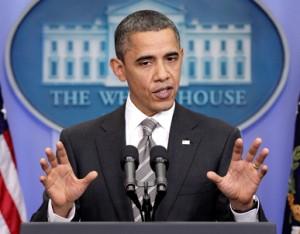Senate Republicans adamantly oppose a major tax cut, while Senate Democrats fight to pass it. No, you did not read that wrong.
Obama’s proposal to extend and expand the payroll tax cut has the parties appearing in a surprising role reversal.
“It puts this whole weird spin where you have Democrats supporting tax breaks and Republicans opposing it,” said Associate Professor of Political Science Kyle Dell. “But when you see it in the context of (the election in) 2012, I think you can start to understand something that on the face of it doesn’t look like it makes a lot of sense when you’re thinking about stereotypes.”
Originally, the payroll tax cut slashed the payroll tax from 6.2 percent to 4.2 percent, according to the San Francisco Chronicle.
For a middle class family making $50,000 a year, this means putting an extra $1,000 in their pockets annually, according to the White House website’s payroll tax cut calculator.
However, with the cut set to expire on Dec. 31, the clock is ticking.
Obama proposed to expand the payroll tax cut by further lowering the tax to 3.1 percent.
That same $50,000 dollar a year family would annually keep an additional $550, on top of their current savings of $1,000.
“I can totally understand not having that money is going to be a hit at a time when people don’t need hits,” said Dell. “On the other hand, the money has to come from somewhere.”
This issue is producing a lot of tension between Democrats and Republicans.
“I think Democrats have the better argument,” said Ken Gilmore, associate professor and chair of political science. “They’re saying: pay for it by permanently ending the Bush tax cuts and raising a surtax on income above a million dollars.”
The Democrats’ proposal to levy a 3.25 percent surtax on annual incomes of $1 million or more was rejected by the Senate on Dec. 1, according to Bloomberg.
“So let me get this straight, you don’t want to raise taxes on the rich, but you don’t want to lower taxes on the middle class,” said Gilmore. “Wow.”
“I think that taxes on all affluent households are too low,” said Professor of Economics Bob Williams. “They should be raised on not just millionaires but on most high-income households.”
This issue is made even trickier by the looming 2012 presidential election.
“A lot of this proposal is more political than it is economic,” said Williams.
Many Republicans, however, say the reason they will not support further tax cuts is because they have not worked in the past.
“Last year, we were in the same place when we proposed the first payroll tax holiday,” said Republican Congressman Jeff Flake to Fox News. “A lot of us said we shouldn’t do it because we’d be in the same place next year having to do it again. And guess where we are? Not to say I told you so … We can’t continue to do this.”
“It hasn’t stimulated the economy at all,” Republican Representative Louie Gohmert said to Bloomberg Businessweek. “But over the long term, it does add to our deficit.”
Dell agrees that our economic problems are not getting better and points out a political angle of the issue at hand.
“(The economy) is still on life support,” said Dell. “The life support is keeping us from dying, but it isn’t making us any healthier. And you can understand how that works really well for the Republican presidential candidate. Because then this helps us to support the whole narrative that Obama is a failed president.”
Not only is there disagreement between Democrats and Republicans, but also within the Republican Party itself.
“(The Republicans) want to figure out a politically palatable stance collectively to take that doesn’t look like they’re defending the tax breaks for millionaires at the expense of ordinary people,” said Gilmore. “Any tax cut has to be offset, at least for the deficit hawks. The problem is you don’t do it by raising taxes because you’ve got the anti-tax people.”
With so many factions fighting about so many elements of this issue, it seems unlikely that Senate will reach a decision anytime soon.
“Instead of compromising, we’re kicking the can down the road,” said Dell. “But what’s happening is that can is getting bigger every time we kick it. And there’s going to come a point where we can’t kick that can anymore. The can’s going to kick us.”

